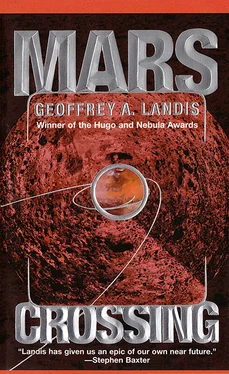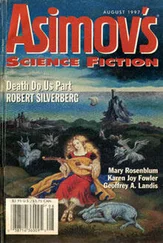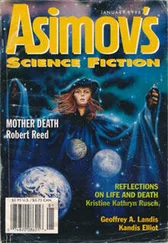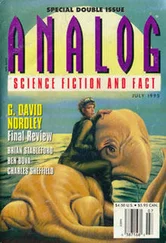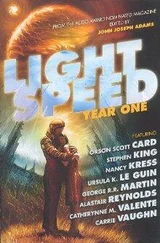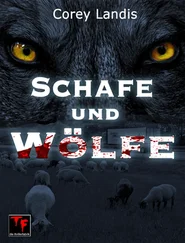The flash of the first rifle was like a brief strobe light; the report punctuating the distorted base line of the music.
The policemen had moved back. They formed a line, dark silhouettes with rifles raised, laughing and smoking American cigarettes and shooting children. One at a time the rifles flashed, and at each shot, another of the children jerked and died.
She would be next. She huddled over, whimpering. The humidity of the night was suddenly oppressive, like a weight pressing down on her chest. She wished Gilberto was next to her.
And then suddenly there was bright light, not just flashlights, but the burning glare of searchlights. Someone kicked the tape player, and in the sudden silence the cut-off guitar chord echoed off the buildings. Then there was the amplified booming of voices too loud to comprehend. “DROP YOUR WEAPONS. YOU ARE SURROUNDED. DROP YOUR WEAPONS AND RAISE YOUR HANDS.”
“Gilberto!” she shouted. In the harsh blue illumination of the searchlights, the bodies of the street children looked like no more than piles of empty clothes, heaped helter-skelter in a puddle of blackness that slowly seeped away toward the gutter. She ran to it; frantic, searching the faces.
Gilberto was not there. No, there. There was the dark red shirt, torn at the sleeves, the shirt he had worn, and those were his pants, but where was Gilberto? Surely that could not be him. She ran to the body inside Gilberto’s clothes, but it was too small. Surely Gilberto couldn’t have been this small, barely more than a mannequin made out of sticks. The body couldn’t have weighed more than twenty kilos. She looked into its face, and Gilberto’s eyes, bloodshot from gasoline fumes, stared back at her out of a lifeless body. But it couldn’t be Gilberto, Gilberto was too clever, Gilberto had escaped, he always escaped.
Then they dragged her away.
She didn’t cry; long ago Gilberto had told her never to cry, never to show emotion, never show weakness. No one looked at her, no one comforted her, no one even treated her as a human being. She didn’t expect it.
“Thieves,” one of the policemen said. “Beggars, drug dealers, and whores. Who cares about them?”
“The death squads make us look bad, you know that,” his companion told him. “It’s the foreign journalists.”
“Yeah, but why couldn’t we have waited until they finished shooting before coining in to arrest them? Or we should sell ’em for their organs. I hear that the North Americans pay a thousand dollars per kidney.” He looked down at Estrela, a look like a hawk examining a mouse in its claws. “You figure that’s right?”
“How should I know? But you better not try to sell this one; the lieutenant saw her rounded up alive.”
The first policeman snorted. “What, you think I’d dirty my hands?” He spat on the ground in front of Estrela’s feet. “So what do we do with her?”
“What do you think? She goes to Father Tomé.” The second one shrugged. “He takes in all the filth of the city. One more, to him, it’s nothing.”
And so, in one night, her life on the streets of Rio ended. Estrela the street urchin of Rio vanished silently away, and a new Estrela, a person she had never imagined that it was possible to become, was born.
Tana was excited.
The desire to explore is a disease, and for all that Tanisha Jackson had been struck by it later than most, she had been still been hit hard. Driving the rockhopper across the sands of Mars was, to her, the fulfillment of her wildest imaginings. Everything about it was exciting. The color of the shadows, the patina of cementation on the soil, the very shapes of the rocks told her she was not on Earth. Every mile they drove she saw something new.
After two hours of driving, Radkowski called for a stop to give them a chance to stretch. Two hours was long enough inside a tiny pressurized cabin meant for a crew of only two, and they all needed some relief, a chance to stretch, to walk around a little, to give their stiff muscles a chance to relax.
Ryan Martin, on one of the dirt-rovers, pulled in next to them and dismounted. His suit was filthy, spattered from head to foot with a coating of dust. “All yours, Commander,” he said. “I’d hand you the keys, but I seem to have misplaced them. Guess you’ll have to hotwire it.”
He turned the dirt-rover over to Radkowski, who would take the next shift on forward scouting, and Radkowski in turn gave him command of the rockhopper and wobbled away slowly on the dirt-rover for a test drive.
“How is it out there?” Tana asked.
“Wild and desolate,” he said. “But in its own way, beautiful.” Through his visor, she could see him shaking his head. “No place to raise children, though.”
That was an odd thing to say, she thought. Ryan had never expressed any interest in children. He was widely known as a confirmed bachelor. The girls had privately tagged him the heartbreaker of Houston; he was interested enough in the opposite sex, sure, but just for the night. He just didn’t seem to have intentions of settling down with one woman.
Tana was scheduled to take over from Estrela on the second dirt-rover, but Estrela was nowhere around. Ryan said that she had called in, saying that she was twenty kilometers ahead and didn’t see any point in backtracking to meet them; she would wait for them, and they could change drivers when they caught up.
So she would have to get back in the rockhopper. Fine. That was just like Estrela, thoughtless and self-centered. But she didn’t have to get in just yet.
“I’m going to look around,” she told Ryan.
“Fine, as long as you don’t go far away from the rover,” he said. “It’s a fifteen-minute stop, no more.”
“Got it, boss,” she said.
They weren’t far from the ridge. Although it was covered with loose rocks, it looked like it would be easy enough to climb, but she knew she wouldn’t have time. It was basic basin-and-range territory; she knew that from the geology field trips in Nevada and Texas that had prepared them for what they would see on Mars. Not a good place to look for signs of fossil life. Still, she examined three rocks that looked like they had signs of carbonate globules, and cracked one open to inspect the cross section. The call to return to the cabin came all too soon.
She looked at the tiny pressurized cabin. Shit. She couldn’t go back in there. It was just too crowded. Now that she had stretched, she just couldn’t force herself to go back inside.
She climbed up on the rockhopper and continued up, until she found a place to sit on the very top, her legs straddling around the crew cabin, one leg on either side. There was even a tie-down eyelet that could be used as a handhold.
“Ryan? I’m staying out here.”
“Negative. We’re ready to go.” There was a pause, and then he said, “Where are you?”
She could see him standing below her, looking around in all directions. “Look up,” she said.
“What?” He looked up at the mountain range, his back to her, rotating his whole body from side to side to scan the slope.
“No, here,” she called. “Up here on the rockhopper.”
He swiveled around to look at the rockhopper. “You can’t ride up there!”
She smiled. “Want to bet I can’t? Think you can get me down? And, anyway, I’m just riding with you for fifteen more miles. If I ride up here, I can just hop off and switch with Estrela; you don’t even have open the hatch. Well, except to let her in.”
Trevor was already inside, waiting. Ryan stared up at her in silence for a few moments, started to say something, and then stopped. “Well, don’t think we’re going to stop to pick you up if you fall off,” he said at last, and swung around and up into the hatch to the pressurized cabin.
Читать дальше
